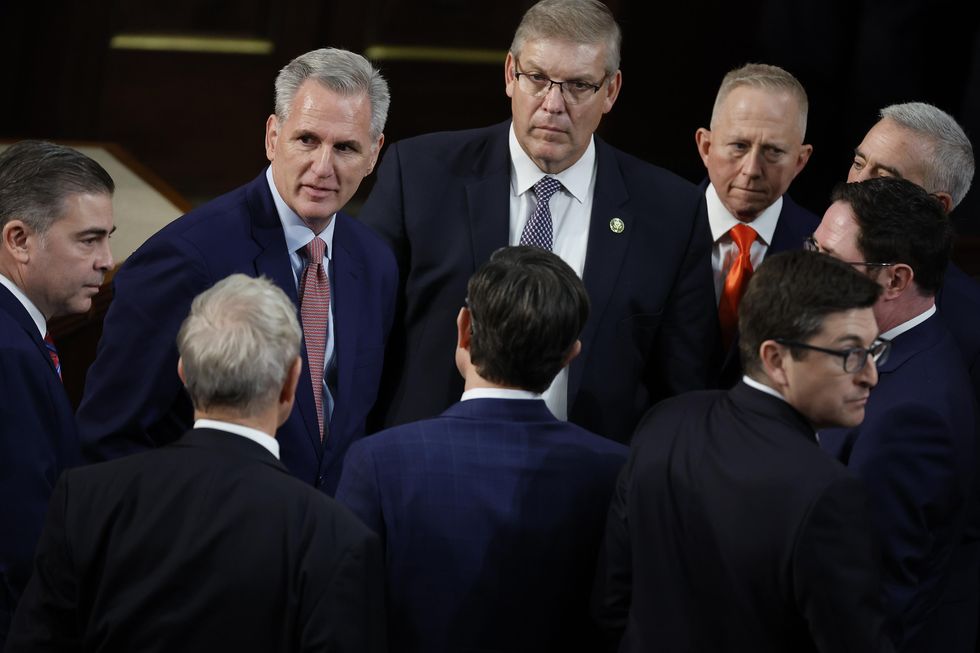
It’s unclear who will ultimately wield the House speaker’s gavel and lead the GOP’s narrow majority in the chamber after Rep. Kevin McCarthy failed to win enough support in three consecutive votes on Tuesday.
But progressive advocates say the appearance of intense and seemingly insurmountable divisions within the Republican conference—which corporate media outlets have
made the center of attention in recent days—belies the extent to which the party is united on issues of critical importance to the U.S. public.
One such issue is Social Security, a program that Republicans have targeted for cuts and privatization for years under the guise of “saving” it from insolvency even though its finances remain strong and it can’t—by law—add to the deficit, rendering common GOP talking points moot.
“Republicans may be in ruins, with the lunatic extremists fighting the slightly less extreme extremists,” Social Security Works PAC president Jon Bauman
wrote on Twitter as Tuesday’s speakership vote descended into chaos.
“But there’s one thing you can count on,” he added. “They ALL want to cut your Social Security.”
Months before the internal GOP struggle over the top House post burst into the open, a group known as the Republican Study Committee (RSC)—comprised at the time of 158 of 212 members of the House GOP caucus, including McCarthy supporters and detractors—released a
policy agenda that called for gradually raising the Social Security eligibility age to 70 and means-testing the program’s benefits.
The RSC plan, unveiled in June, also called on lawmakers to “consider legislative options that allow employers and employees to reduce their payroll tax liability and use those savings to invest in private retirement options.”
“There’s one thing you can count on. They ALL want to cut your Social Security.”
In subsequent months, including
shortly before the November midterms, a number of House Republicans made plain their intention to pursue deeply unpopular cuts to Social Security and Medicare should they retake control of the chamber.
Specifically, GOP members such as Reps. Jason Smith (R-Mo.), Jodey Arrington (R-Texas), Buddy Carter (R-Ga.), and Lloyd Smucker (R-Pa.)—all of whom voted for McCarthy on Tuesday—threatened in October to use a looming fight over the debt ceiling to force long-sought cuts and changes to Social Security.
The federal government is expected to reach the borrowing limit, an arbitrary figure set by Congress,
some time early this year, once again raising the specter of default.
McCarthy, who is now locked in a struggle to lead his party’s slim House majority,
signaled in October that he would support attempts to enact spending cuts in exchange for an agreement to raise the debt ceiling. The California Republican also joined the far-right flank of his caucus in vocally condemning the recently passed omnibus funding package, which averted a government shutdown last month.
Vox‘s Andrew Prokop argued that the “speakership chaos,” which is set to resume Wednesday, “could well presage a catastrophic collapse of American governance over the debt ceiling and funding issues this year—or at least a very tense situation until a deal can be worked out.”
“We could be in for a dangerous showdown—one in which Biden may have to explore options for addressing the debt ceiling without congressional support at all,” Prokop added.
Social Security Works echoed that warning on Tuesday,
writing on Twitter that “the Republican caucus is in chaos, with their most extreme members in the driver’s seat.”
“In response,” the group added, “Democrats must stand strong and united to protect Social Security from Republican hostage-taking.”




